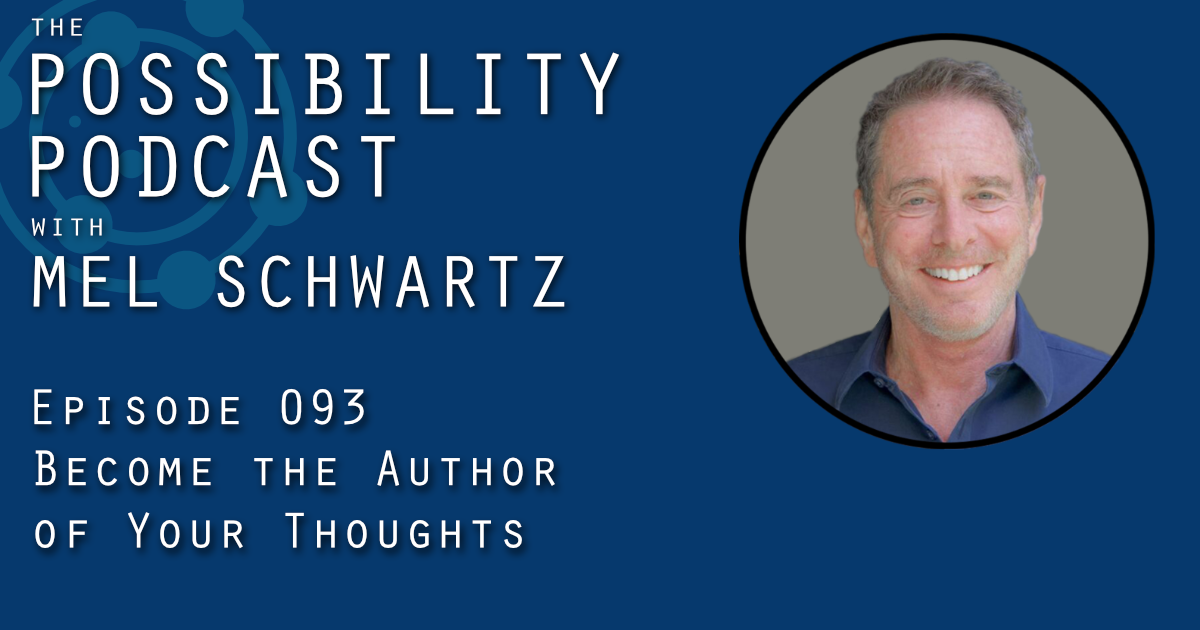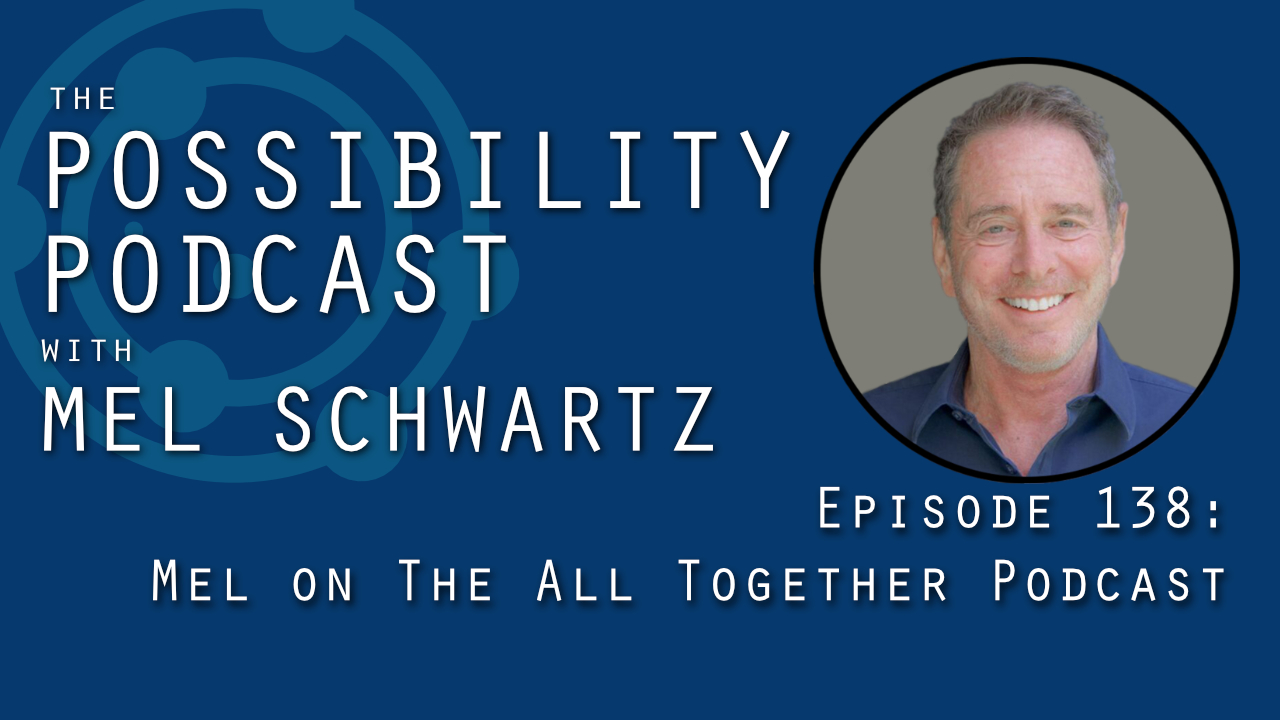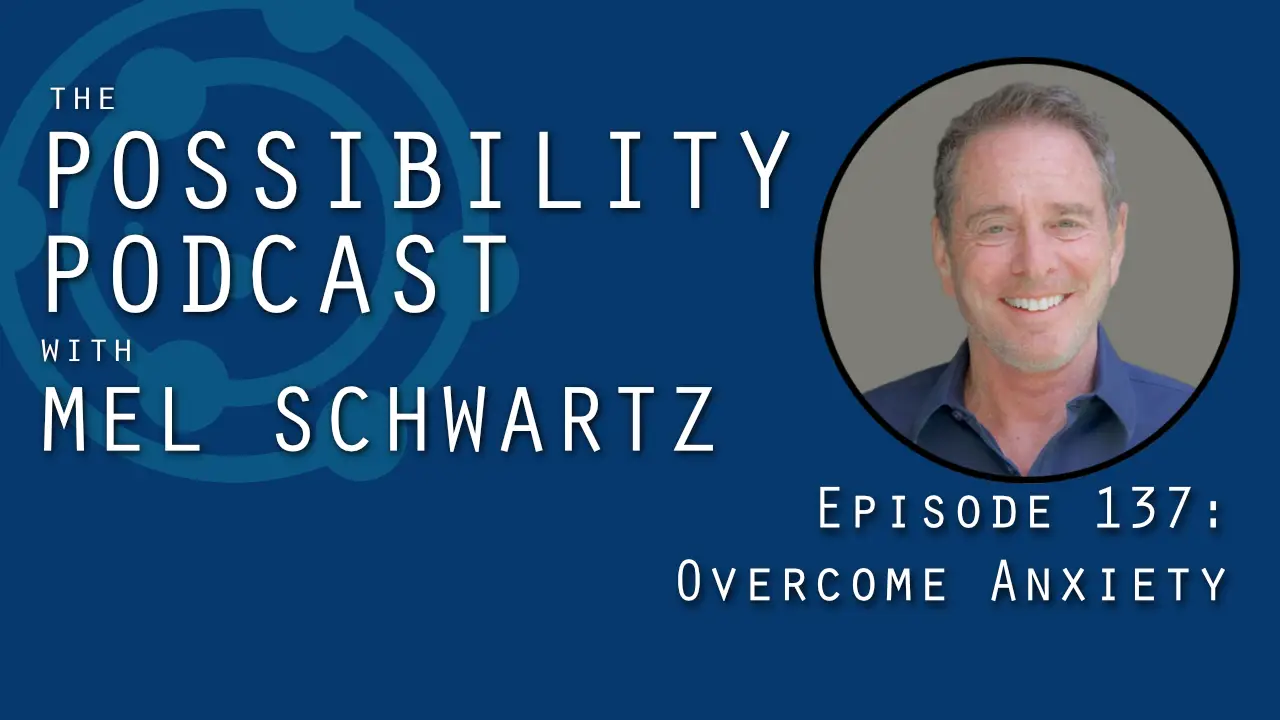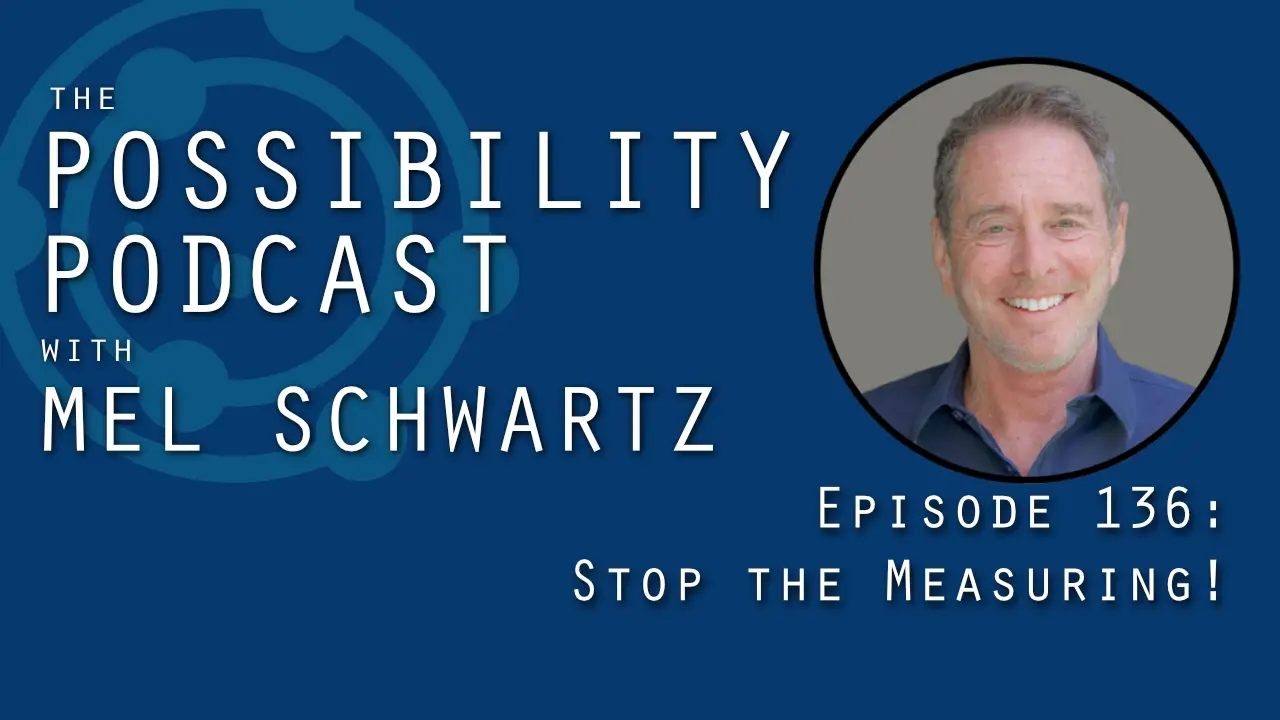Podcast: Play in new window | Download
The Possibility Podcast with Mel Schwartz episode 093 examines the tricky question: who is the author of our thoughts?
It might seem like we are the author of our own thoughts, but for most of us, we’re simply following along, letting our actions be dictated by our thoughts.
What if we could turn that around?
Imagine a fulfilling life of exciting opportunities, of wisdom and peace, free from fear.
Listen to this episode to hear how to become the author of your thoughts and an active participant in your active, not reactive, life.
I welcome your comments!
Subscribe to The Possibility Podcast with Mel Schwartz
Don’t miss a single Possibility Podcast with Mel Schwartz! Subscribe for free in iTunes / Apple Podcasts, YouTube, Spotify, RadioPublic, Spreaker, or wherever you listen to podcasts. Or, simply copy / paste the RSS link directly into the podcast app of your choice!
Please Rate and Review
If you enjoy The Possibility Podcast with Mel Schwartz, please take a moment to rate and review the show in iTunes / Apple Podcasts or Podchaser. It only takes a few minutes, and adding your review is as easy as clicking this link.
Your rating and review helps raise the visibility of The Possibility Podcast with Mel Schwartz, especially on iTunes / Apple Podcasts, which is one of the biggest podcasting platforms today. More visibility for the show means more listeners… and that growth means the show reaches — and helps — more people like you.
Thank you!
Talk With Mel!
Help others when Mel helps you: Contact Mel and find out how you can be a caller on the show and ask Mel a question. He’ll put the Possibility Principle to work for you, and your conversation will be recorded for use in a future episode of the podcast so other listeners can benefit.
Transcript of The Possibility Podcast with Mel Schwartz #093
Hello everybody and welcome to the Possibility Podcast. I’m your host Mel Schwartz. I practice psychotherapy, marriage counseling, and I am the author of the book, The Possibility Principle, the companion to this podcast. I hope to be your thought provocateur and I’ll be introducing you to new ways of thinking and a new game plan for life.
I was working the other night on my new book, Uncommon Sense. I was struggling with a particular sentence. It just wasn’t flowing correctly. I was aware of the fact that I was hitting the delete button as I was reconstructing parts of the sentence, changing out some words, replacing them with other words. As I was doing that, it was evident to me that I am clearly the author of the words and sentences and paragraphs that I am writing. And yet I realized that we all struggle, myself included, with being aware of the thoughts that we have.
Our thoughts trick us in that they report the truth. They construct reality. And we often don’t see that we are the author of those thoughts, that there is me, a sense of myself, an I that lies above the thoughts, waiting to be empowered and to surface.
So ask yourself these questions.
Is there a sense of me that’s more than your thoughts? Is there a sense of me that yearns for change and seeks possibilities? Even more, is there a me that’s potentially wise and fulfilled, a me that’s at peace and in harmony, that sees clearly, that is not reactive, a me that doesn’t reside in fear?
Well, if only we can become aware of our thoughts the way we are aware of the words that we construct in a sentence.
When you write, you know you’re writing, you delete and edit, you’re the author. We’re going to talk about how to do the same thing with your thoughts.
To make a distinction, when I can see my thoughts, that is what I call thinking. Thinking is the goal. That is being the author of your thoughts, the navigator of the path that you are on.
Thoughts trick us in that they are literal. Firstly, we’re often not even aware of having thoughts. But if we are aware, the first step is what are my thoughts telling me? They’re telling me the truth about something. They’re telling me about what is or what isn’t, who you are, what you did right or wrong, what your intentions were.
The thought tricks us in that it’s literal and the old thoughts tend to continue to regurgitate and replicate themselves. Do you ever wonder why it’s hard to change? Simply, we keep having the same old thoughts. How can we change when we have the same old thoughts?
You’ve probably heard me say many times, the most important relationship you will ever have in your life, the most intimate relationship that will impact you far more than any other, it’s not your relationship with your parents, your children, your wife, your spouse, or your lover, or your best friend.
The relationship that’s going to impact you more than any other is with your thoughts. They are your constant companion. Are they your ally? Or are they your enemy?
Now what I’m going to try to help you understand is that nanosecond between your thoughts when you can see the thought. There’s a space that emerges. In that space, we engage the state of possibility.
Sometimes people think that when I’m talking about seeing your thought, it’s about substituting a positive thought for a negative thought. No, it’s not about simple, reductive substituting of thoughts. Again, developing the capacity to see your thought operating is thinking. That is conscious awareness.
What lies above the repetition of thought? The realm we want to access is conscious awareness.
Let’s just do a deeper dive first into the nature of thought. The classical traditional biomedical understanding of the brain suggests that our thoughts are impacted by our brain chemistry, and our thoughts are the result of electrical and chemical processes. This is old school Newtonian thinking. It’s not that way. It’s the other way around.
So many renowned thinkers, quantum physicists like David Bohm, the Indian philosopher Krishnamurti, and the Dalai Lama have all suggested it’s the other way around, that our thoughts influence our biochemistry. The Dalai Lama, in fact, was influential in researching the brain chemistry of deep meditators, which demonstrated that their brains, their brain chemistry were altered by the practice of meditation. We should see this as encouraging, exciting news, because it means we are not at the mercy of our brain chemistry often or in many cases, we create our brain chemistry.
So our thoughts can either be our supportive benefactors, or they can be our antagonists. And a particular thought can either imprison us or empower us. We tend to believe that modifying our thoughts requires modifying our brain chemistry, maybe with medication.
Well, let’s look at the concept of neuroplasticity, which is the brain’s ability to reorganize itself. By forming new neural connections, the brain has a plasticity, it’s a muscle, we can work it out.
So the brain is flexible to a far greater extent than we ever understood. Don’t think of your brain as a factory that manufactures your thoughts. That’s mechanism. Think of it the other way around. If you’re walking on the beach and look behind you, you see your footprints in the sand. The sand did not manufacture your footprint, your foot left its mark in the sand. In the same way, thought leaves its mark on the brain. This can open a potential shift in your operating beliefs. So we no longer think of ourselves as hard wired in a certain way.
I’d love to show you my appreciation for your subscribing to and rating this podcast by offering you a gift to one of the following, The Power of Mind, a live talk that I gave, or one of my digital eBooks, Creating Authentic Self-Esteem, Overcoming Anxiety, or Raising Resilient Children, and lastly, Cultivating Resilient Relationships. Once you have subscribed, please send an email to mel at melschwartz.com and just let me know which gift you’d prefer. Thanks.
You know, there’s an old saying, change your thoughts, change your life. Well, more to the point, become the thinker of your thoughts. You see that exhortation, change your thoughts, change your lif e. It’s insufficient. You don’t want to merely substitute a positive or a preferable thought for a negative one. That doesn’t address the most important matter of how we think. It’s far more important to be able to think than to be the end product of your thoughts.
So what I’m proposing is, it’s a new mindscape in which our thinking flows from peacefulness, wholeness, coherence, rather than the fragmenting of thought that’s just reporting in on false beliefs all over the place.
The moment we have a thought, we don’t see the thought operating. We become attached to that thought. It becomes our truth. And that automatically summons up our own personal biography of all the accompanying emotions. So we get stuck in all thought and all feeling. They trigger each other. And that’s why we cycle up or down emotionally on a roller coaster following our old thought and old feeling. They act in tandem.
Our thoughts are primarily informed by our beliefs, many of which are the results of those old wave collapses, those experiences in which our identity got confined and limited. So the goal is thinking, seeing your thoughts operating. New thinking frees us from the replay of old thoughts.
I used to say, if you were old enough to remember vinyl records, but they’ve made a comeback so you may not have to be old enough. But when there was a scratch in the record you were playing, the needle would get stuck in a groove. The same lyric or music would just keep repeating itself. And unless we lift up the tone arm, it keeps replaying the same music.
Similarly with thought, it gets stuck. It summons up old memories and feelings, and we are unable to change. Thought is automatic and it presents itself without our noticing it. So we become trapped in a rut of old thought.
The first step in liberating yourself is to see or notice your thoughts. If you don’t notice your thought, you attach to it and you’re reduced to the thought. Seeing our thoughts is a matter of timing. With practice, you can learn to become alert and vigilant and see a particular thought operating.
Think of it this way, learning to see your thought operating is like watching a slow-motion replay from, let’s say, a sports event. You see the play unfolding slowly and clearly. Well, we are truly thinking when we see our thoughts operating. That’s the goal of thinking.
Here’s another analogy. You’re playing tennis. The tennis ball is the thought and becoming aware of the thought is kind of like anticipating the arrival of the ball as it’s coming to your side of the net. You see your opponent’s positioning and their footwork, their movement of their racket. Is it a forehand or a backhand? And as the ball advances toward us, we anticipate its arrival.
We can develop that kind of muscle memory with thought. We can learn to see it in advance of becoming it. Now, developing this awareness of thought is essential to learning how to achieve thinking and a mastery of thinking.
Think of it this way. If I can’t see the thought, I won’t be having the thought. The thought will be having me.
Now don’t judge your thoughts. If you judge them, you’re judging them with other thoughts.
Here’s an exercise. Throughout the day, try to notice your thoughts. Imagine sitting in front of a large TV screen and watching your thoughts being transcribed. Don’t judge them, just see them. Sit back, be detached and observe what you’re seeing. You’ll start to develop the acuity to see your thoughts. Or you’re walking in the street or just having lunch or doing whatever you’re doing in the course of your day. Ask yourself, prompt yourself, what is the last thought that I just had? See it, notice it, release it.
Or think about fishing. Many people fish and if they’re not going to eat the fish, hopefully they catch the fish and release it. Catch your thought, release it.
As you develop this ability, you’re going to see a persistence of old, critical, negative, fearful thought. As you begin to notice that kind of thought, imagine putting your forefinger in front of your lips and simply saying, shh, or quiet down to the thought. Thought is like a knock at the door. You can hear the knock, but you don’t have to open it.
Now as you progress in this ability to see your thoughts, you will look at the recurring themes they’re presenting. There are limiting, where you’ve collapsed beliefs in there. Like I always choose the wrong friends, or what’s wrong with me, or why didn’t I see that he was so selfish?
Whatever that limiting thought is, notice the thought and ask yourself, where did it come from? These recurring thoughts are limiting and they become self-fulfilling prophecies. Now once you’ve progressed in your ability to see these thoughts operating, you’ll start to develop a space between your thoughts. In that space, there’s an extra moment to access your state of possibilities, your superposition, the state of pure potential.
In the instant before you become your next thought, you enter a state of possibility. Everything is possible. One of the primary principles of the possibility principle is that this is the moment worth seeking. A heightened level of awareness regarding thoughts, the ability to think. It allows us to be responsive instead of reactive. It allows us to become a martial artist in our communication. Not at war, but empowered. Between the instantaneous reactions of our thoughts, in that space lies a wiser and deeper sense of self waiting to emerge. And this is the self that notices its thoughts and of course your feelings. And it isn’t reduced to simply being the end product.
In the space between my last thought and my next thought, I emerge. The I to which I’m referring is wise and deep, far more than my thoughts. I can choose to think differently, to see things differently. This moment of awareness kind of brings us to a precipice where we can elect to become
the master of our thinking and have defining moments. These are the defining new wave collapses in which we break free from the confines of old habits, old thoughts, old feelings. We don’t know what’s to come, but we’re comfortable not knowing what’s to come. We can cultivate that space for new thinking to emerge.
It bubbles up when we can get out of our own way and it allows a deeper intuitive wisdom to arise. We then develop a relationship with our wise, intuitive, deeper being. And this, friends, enables us to come out of our script, to break free from our stories, our old wave collapses, our old feelings and our old hurts and start to write a new script for our life.
If you need a refresher or a deeper dive into this, please go back into my book, The Possibility Principle. More to come on all of this.
Until we meet next time and I speak to you next time, see your thought. Don’t become your thought. Enter that space and access that deeper intuitive knowing and being. Be well and be the thinker of your thoughts.
I hope you enjoyed this episode of The Possibility Podcast. I welcome your feedback on this and any episode. Please send me an email at mel at mel schwartz dot com or leave a comment in the show notes for this episode at mel schwartz dot com. If you like what you’re hearing, please take a moment to rate and review the show at Apple podcast, Spotify or wherever you get your podcasts. Your reviews really help boost the visibility for the show and it’s a great way for you to show your support.
Finally, please make sure to subscribe to The Possibility Podcast wherever you listen to podcasts and that way you’ll never miss an episode.
Thanks again and please remember to always welcome uncertainty into your life and embrace new possibilities.




